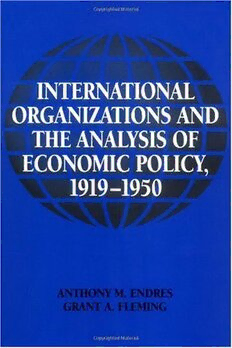
International Organizations and the Analysis of Economic Policy, 1919-1950 (Historical Perspectives on Modern Economics) PDF
306 Pages·2002·1.05 MB·English
Most books are stored in the elastic cloud where traffic is expensive. For this reason, we have a limit on daily download.
Preview International Organizations and the Analysis of Economic Policy, 1919-1950 (Historical Perspectives on Modern Economics)
Description:
From the end of World War I through the early years of the Cold War, international organizations such as the League of Nations, International Labor Organization, the Bank for International Settlements, and the United Nations had a major influence on policies adopted among member nations. This book surveys ideas produced by those organizations on such vital matters as the international business cycle; trade policy; social policy; public expenditure; taxation and government investment activity; money and exchange rate management; wage setting and full employment and the rich country-poor country divide. The work reveals explicit normative agendas underlying international political economy, and lessons are distilled for today's debates on international economic integration.
See more
The list of books you might like
Most books are stored in the elastic cloud where traffic is expensive. For this reason, we have a limit on daily download.
